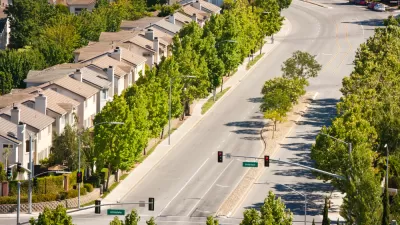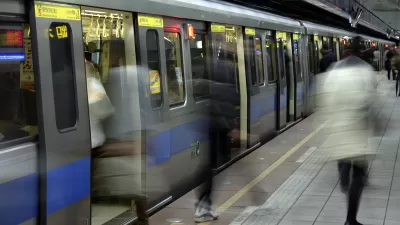Canada

Another Study Shows That Narrow Is Safer Than Wide for Traffic Lanes
Better Cities & Towns gives its imprimatur to the "narrower is better" approach to lane width for traffic safety thanks to a study by Toronto transportation planner, Dewan Masud Karim, presented at the Canadian ITE annual conference.
One Bridge on the Way, Another Still Possible on U.S.-Canada Border
With a request for qualifications for a new bridge, connecting Detroit with Windsor, Canada, and a proposal for another bridge on the table, it'a bridge building time on the U.S.-Canadian border.
The Inuit: A View From the Top of the World
A little history on the Inuit of the Circumpolar Region as the kickoff in a blog series by Hazel Borys
Toronto's Gardiner Expressway: Green Light for Removal This Week?
Toronto City Council votes on June 10 whether to remove or rebuild the Gardiner Expressway East.
Québec Institutionalizes Its 'Fight Against Climate Change'
For Québec, climate action is a top priority that transcends party agendas—so the province is partnering with other sub-national entities to bypass national politics in building a cap-and-trade market.
Montreal Debates Tolls or Mileage Charges to Finance Bridge Construction
A powerful realty group fears tolls will 'marginalize' downtown Montreal, so they propose a regional kilometer-traveled-fee to finance the new Champlain Bridge.
Older Oil Tank Rail Cars Face Three-Year Deadline to be Replaced
Following up on last month's emergency rule addressing trains speeds, the Transportation Department issued new rules addressing tanker car standards, long thought to be one of the most important factors contributing to fiery oil tank car explosions.
Ontario to Join Quebec in Cap-and-Trade Program
Ontario Premier Kathleen Wynne made a strong case for taking decisive climate change action when she signed an historic agreement to join the Quebec program that trades carbon with California.

U.S. Subway Car Design Behind the Curve
Yonah Freemark examines U.S. subway systems and notes the lack of "open gangways" (i.e., the space between the cars). Only in the U.S. do doors separate cars. What gives?
Crude-by-Rail's New Workhorse No Better than the Old Workhorse
The new oil tank cars were supposed to be key to preventing the fiery explosions associated with oil-train derailments. However, four recent explosions since Feb. 14, with two occurring last Thursday and Saturday, all involved the new tankers.

On the Benefits of Compact Development
The environmental think tank environmental Sustainable Prosperity has created a handy infographic describing the benefits of dense urban development compared to sprawl.
Cause of Crude-by-Rail Explosions Identified
The Wall Street Journal's senior energy reporter, Russell Gold, is interviewed on NPR about the February 16 derailment and explosion in West Virginia of an oil-train hauling 109 tanker cars of Bakken crude from North Dakota.
The End of the Keystone XL Pipeline Saga?
Within hours of receiving the bipartisan bill on Tuesday to authorize the Keystone XL pipeline, President Obama made good on his promise to veto it. The legislation would have short-circuited the approval process, which upset the president.
Canada to Hold Shippers, Railways Fully Accountable for Oil-Train Derailments
Since the July 2013 derailment and explosion of an oil train in Lac-Mégantic, Quebec* killed 47, Canada has contributed C$155 million toward the rebuilding effort because the railroad's insurance was insufficient.

What Are North America's Most 'Youthified' Cities?
Gentrification has famously, and controversially, changed the face of many neighborhoods. Less well known is the process that geographer Markus Moos calls "youthification," in which neighborhoods don't become richer so much as they become younger.

City Leaders Flex Muscle in Ottawa
Canadian cities are no strangers to rankings of the world's most functional, attractive cities. Even so, the mayors of Canada's 22 largest cities want national leaders in Ottawa to adopt an even more explicitly pro-urban national agenda.
Senate Passes Keystone XL Authorization Bill: What's Next?
The new Republican-controlled Senate achieved its first major legislative victory on Thursday (Jan. 29) by passing S.1 to authorize construction of the Keystone XL pipeline. Five more votes are needed to override a potential presidential veto.
So Much for an Easy Keystone Victory for Senate Republicans
With the turnover of leadership in the Senate to Republicans in January, the only Keystone question was whether advocates had enough votes to override a promised presidential veto. Turned out they were unable to overcome the first filibuster of 2015.
Solving the 'Female Advocate Dilemma'
Melissa Bruntlett pens a thoughtful essay on the importance of female involvement in urbanism issues and activities.
Nebraska Supreme Court OKs Keystone XL; U.S. Senate has the Next Move
The House voted for the tenth time to approve the pipeline, and a split decision by the Nebraska Supreme Court removes a key objection of President Barack Obama to ruling on Keystone XL. The Senate begins debate Monday.
Pagination
Urban Design for Planners 1: Software Tools
This six-course series explores essential urban design concepts using open source software and equips planners with the tools they need to participate fully in the urban design process.
Planning for Universal Design
Learn the tools for implementing Universal Design in planning regulations.
Caltrans
Smith Gee Studio
Institute for Housing and Urban Development Studies (IHS)
City of Grandview
Harvard GSD Executive Education
Toledo-Lucas County Plan Commissions
Salt Lake City
NYU Wagner Graduate School of Public Service


































